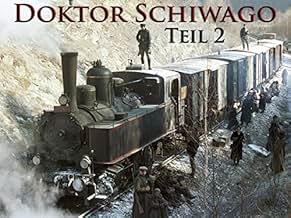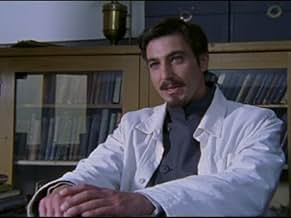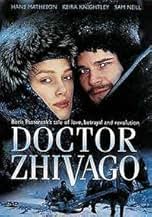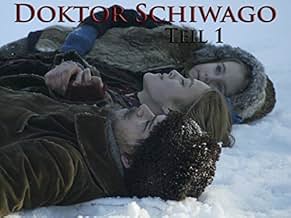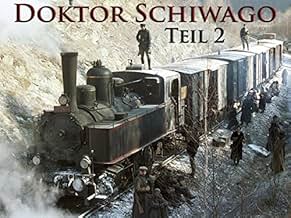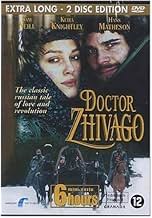Füge eine Handlung in deiner Sprache hinzuDoctor Zhivago falls for Lara despite being engaged. Their forbidden love blossoms amidst the upheaval of the Russian Revolution, impacting his career and family.Doctor Zhivago falls for Lara despite being engaged. Their forbidden love blossoms amidst the upheaval of the Russian Revolution, impacting his career and family.Doctor Zhivago falls for Lara despite being engaged. Their forbidden love blossoms amidst the upheaval of the Russian Revolution, impacting his career and family.
- Nominiert für 3 BAFTA Awards
- 5 Nominierungen insgesamt
Folgen durchsuchen
Empfohlene Bewertungen
Pasternak's novel was a love story tucked in an epic set against the turbulent Russian revolution. The novel itself, with its story of illicit love in time of war, was almost the GONE WITH THE WIND of its day. When the time came to make the movie the task fell, quite naturally, to epic film maker David Lean, winner of the Academy Award for his last two pictures (BRIDGE ON THE RIVER KWAI, LAWRENCE OF ARABIA). Lean and screenwriter Robert Bolt (A MAN FOR ALL SEASONS, LAWRENCE) did a superb job of distilling the essence of the novel, but left out many characters and events in their 197 minute motion picture (which, until the advent of Lucas and Spielberg, was one of the highest grossing movies ever). Robert Bolt won a deserved Oscar for his work on DOCTOR ZHIVAGO, for his job was formidable. But now that Pasternak's epic sweep was personified by Lean and Bolt, a television version was needed whose focus was Pasternak's (admittedly soap-opera) story without sacrificing any of the other events for time limitations.
The television version that finally appeared was barely an hour longer than Lean's. It would be unfair to compare this version to Lean's, which had a powerhouse cast (Christie, Steiger, Richardson, Courtenay, Guinness), a director with an eye for the cinematic, and a superb script. However, when some of the same sorts of scenes appear, the new version seems like a hollow echo.
This new version also truncates the novel. The dialog is pedestrian. In the old days British television would make adaptations of novels this size that went on for months (ZHIVAGO could sustain it). The interiors were videotaped like stage presentation and the exteriors were shot on grainy film, but the breadth of great novels came across. Four hours was not time enough to do justice to Pasternak. Everything seems to boil down to sex in this version, which is daring -- for the 1960s!
On the plus side, it must be said that Keira Knightley (Lara) is pure sex on the screen. Her character is hardly the thrall of Komarovsky she is in the novel (the victim she is in Lean's movie). Again, this might have been daring forty years ago. It seems the writers of this movie missed the other revolution (the sexual revolution) that might've gotten them past this approach to the material to focus on the larger view of the Russian revolution the novel presents. We had the love story, done a whole lot better, decades ago. We're still waiting for a version that does justice to Pasternak.
The television version that finally appeared was barely an hour longer than Lean's. It would be unfair to compare this version to Lean's, which had a powerhouse cast (Christie, Steiger, Richardson, Courtenay, Guinness), a director with an eye for the cinematic, and a superb script. However, when some of the same sorts of scenes appear, the new version seems like a hollow echo.
This new version also truncates the novel. The dialog is pedestrian. In the old days British television would make adaptations of novels this size that went on for months (ZHIVAGO could sustain it). The interiors were videotaped like stage presentation and the exteriors were shot on grainy film, but the breadth of great novels came across. Four hours was not time enough to do justice to Pasternak. Everything seems to boil down to sex in this version, which is daring -- for the 1960s!
On the plus side, it must be said that Keira Knightley (Lara) is pure sex on the screen. Her character is hardly the thrall of Komarovsky she is in the novel (the victim she is in Lean's movie). Again, this might have been daring forty years ago. It seems the writers of this movie missed the other revolution (the sexual revolution) that might've gotten them past this approach to the material to focus on the larger view of the Russian revolution the novel presents. We had the love story, done a whole lot better, decades ago. We're still waiting for a version that does justice to Pasternak.
I am not going to compare two versions of "Doctor Zhivago". To me they are so different that there is not much grounds for comparison.
I possibly can not share fascination with 1965 movie. It could be viewed as a love story performed by two great actors. But it is anything but Boris Pasternak's story. In Russia they would call it "lubok" - a colorful picture, work of one's imagination. Beautiful but having nothing to do with reality.
2002 version is a story that carries one away not only with its plot but also its truthfulness. And I don't mean just following the events of the book.
Boris Pasternak's book is full of pain - personal and collective. 2002 "Doctor Zhivago" shows true Russia, in so many small details - a woman calling chickens, a library in a church building, hospital beds in a corridor, Russian conversations in the background...And pain.
And it is also full of hope, as no matter how horrible life was, hope never died. And you can see hope in the movie - in Lara's eyes, in Yury's smile.
Thumbs up!
I possibly can not share fascination with 1965 movie. It could be viewed as a love story performed by two great actors. But it is anything but Boris Pasternak's story. In Russia they would call it "lubok" - a colorful picture, work of one's imagination. Beautiful but having nothing to do with reality.
2002 version is a story that carries one away not only with its plot but also its truthfulness. And I don't mean just following the events of the book.
Boris Pasternak's book is full of pain - personal and collective. 2002 "Doctor Zhivago" shows true Russia, in so many small details - a woman calling chickens, a library in a church building, hospital beds in a corridor, Russian conversations in the background...And pain.
And it is also full of hope, as no matter how horrible life was, hope never died. And you can see hope in the movie - in Lara's eyes, in Yury's smile.
Thumbs up!
Andrew Davies assured that his version would be true to the Novel. In fact he has replicated all the romantic set pieces of Leans original version - the shooting ( Victor Komorosky was shot in the original version), train journey, Yuri's walk through the trees, meeting with Lara (notice Julie Christie ironing and Keiran washing clothes). Even the production design are similar. Unfortunetly, it does not match up to Leans excellent epic. What about the acting: Keiran is weak as Lara - Julie was better but neither did justice to the Lara role. Hans is the exact duplicate of Omar without the stash but Omar's performance had more depth. Sam Neil as with Hans is a duplicate of Rod Steiger in appearance but Steiger's performance was one of the highlights of Lean's version. Sam was good but weak in comparison. Andrew Davies version was not based on the Novel but on Leans original.
In a word, UGGHH. This tv version of Zhivago is still a poor adaptation of the book and many notches below the 1965 David Lean film. Entire important characters are left out, like Evgraf Zhivago. Although everyone seems to be saying it's so much closer to Pasternak, I don't see it. Many of the scenes are really copied right out of the Lean film... only more poorly done. Hans Matheson is not terrible as Zhivago, just not very interesting. He's nice looking in a boy actor kind of way but not nearly as striking as Omar Sharif. His poetry is left totally unexplored. Keira Knightley, an Uma Thurman clone, is just plain bad. All she can do is look dumbfounded with her gawking mouth hanging open. Sorry, Julie Christie she ain't. There is nothing magnetic about the character. Tonya is an underwritten character in the book, and I think Alexandra Maria Lara does about as good a job with her as can be done. While many criticize Geraldine Chaplin in the Lean version, I find her very moving and certainly striking looking. While I don't think Chaplin is a better actress than Lara, she's more memorable. Reviewers have been gushing over Sam Neill as Komarovsky. Neill is a favorite actor of mine, but I think he's really only so-so here. Rod Steiger seemed far more Russian, nastier and more self-loathing (a key part of the character). Neill was merely slick to me.
Giacomo Campiotti filmed this in Prague and in Slovakia which, at first glance, would seem to be a more real location than Spain, Finland and Pinewood Studios where Lean's Zhivago was filmed. But it doesn't feel that way. It doesn't look open and vast. The villages don't look like Russian villages, and Prague, beautiful as it is, doesn't look much like Moscow. A lot of times, it doesn't even look that cold. There is a curious lack of the cyrillic alphabet. Perhaps it was too expensive to erect old cyrillic signage. The use of background Russian speech is interesting but jarring. It just makes me wish the entire film was in Russian. The music is just an odd hodge-podge. In the second half he uses what sounds like classic Slovakian music which sounds totally wrong in a Russian story. I found the guitar strumming more annoying than anything. Yes, "Lara's theme" does get under your craw, but at least it adds some real emotion to the Lean film.
I enjoy the 1965 film, but it's a wonderful guilty pleasure, I don't see it as a great work of art. This BBC version is just drek. I'm hoping a good Russian director will tackle Zhivago and show us how it's really done. I would have love to see how the director of the Russian film "Vor" would deal with it, or the recently departed Elim Klimov (director of Rasputin and Come and See) whose talents would have perfectly matched the demands of adapting Pasternak.
Giacomo Campiotti filmed this in Prague and in Slovakia which, at first glance, would seem to be a more real location than Spain, Finland and Pinewood Studios where Lean's Zhivago was filmed. But it doesn't feel that way. It doesn't look open and vast. The villages don't look like Russian villages, and Prague, beautiful as it is, doesn't look much like Moscow. A lot of times, it doesn't even look that cold. There is a curious lack of the cyrillic alphabet. Perhaps it was too expensive to erect old cyrillic signage. The use of background Russian speech is interesting but jarring. It just makes me wish the entire film was in Russian. The music is just an odd hodge-podge. In the second half he uses what sounds like classic Slovakian music which sounds totally wrong in a Russian story. I found the guitar strumming more annoying than anything. Yes, "Lara's theme" does get under your craw, but at least it adds some real emotion to the Lean film.
I enjoy the 1965 film, but it's a wonderful guilty pleasure, I don't see it as a great work of art. This BBC version is just drek. I'm hoping a good Russian director will tackle Zhivago and show us how it's really done. I would have love to see how the director of the Russian film "Vor" would deal with it, or the recently departed Elim Klimov (director of Rasputin and Come and See) whose talents would have perfectly matched the demands of adapting Pasternak.
Well, I was truly disappointed in this version of Doctor Zhivago. I have read the Boris Pasternak book and seen David Lean's movie version and this new version simply does not compare. The actors were simply too young for their part and were not able to convey the emotions and complexities of Yuri and Lara. I realize the Movie Industry is trying to attract a younger crowd these days but what was the Casting Director thinking of when he cast the part of Lara? She certainly was not believable as Lara nor a Russian!
Wusstest du schon
- WissenswertesKeira Knightley who was 17, lived on her own for the first time while filming for three months in Slovakia and Prague. She said her Prague flat was located in the center of the city's red-light district and the actress made friends with a local prostitute, who positioned herself directly under her window every night.
- Zitate
Yuri [to Professor]: I'll be a doctor for others, and a poet for myself.
- VerbindungenFeatured in The Story of the Costume Drama: The Greatest Stories Ever Told (2008)
- SoundtracksKorobochka
Russian traditional
At the wedding party of Zhivago and Tonya
Top-Auswahl
Melde dich zum Bewerten an und greife auf die Watchlist für personalisierte Empfehlungen zu.
- How many seasons does Doctor Zhivago have?Powered by Alexa
Details
- Erscheinungsdatum
- Herkunftsländer
- Offizieller Standort
- Sprache
- Auch bekannt als
- Doctor Zhivago
- Drehorte
- Praha hlavni nadrazi, Wilsonova, Prag, Tschechische Republik(Railway station Moscow / Moskva)
- Produktionsfirmen
- Weitere beteiligte Unternehmen bei IMDbPro anzeigen
Zu dieser Seite beitragen
Bearbeitung vorschlagen oder fehlenden Inhalt hinzufügen





